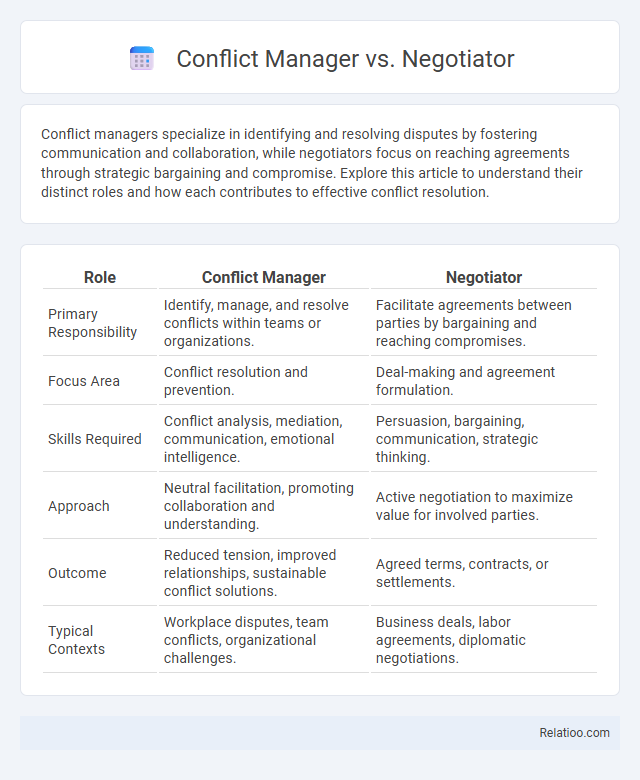Conflict managers specialize in identifying and resolving disputes by fostering communication and collaboration, while negotiators focus on reaching agreements through strategic bargaining and compromise. Explore this article to understand their distinct roles and how each contributes to effective conflict resolution.
Table of Comparison
| Role | Conflict Manager | Negotiator |
|---|---|---|
| Primary Responsibility | Identify, manage, and resolve conflicts within teams or organizations. | Facilitate agreements between parties by bargaining and reaching compromises. |
| Focus Area | Conflict resolution and prevention. | Deal-making and agreement formulation. |
| Skills Required | Conflict analysis, mediation, communication, emotional intelligence. | Persuasion, bargaining, communication, strategic thinking. |
| Approach | Neutral facilitation, promoting collaboration and understanding. | Active negotiation to maximize value for involved parties. |
| Outcome | Reduced tension, improved relationships, sustainable conflict solutions. | Agreed terms, contracts, or settlements. |
| Typical Contexts | Workplace disputes, team conflicts, organizational challenges. | Business deals, labor agreements, diplomatic negotiations. |
Understanding the Roles: Conflict Manager vs Negotiator
Conflict managers primarily focus on identifying, addressing, and resolving disputes within organizations by implementing strategies that promote long-term harmony, whereas negotiators concentrate on facilitating agreements between parties by finding mutually acceptable solutions during specific discussions. Conflict managers analyze underlying causes and work to prevent future conflicts through systemic changes and mediation, while negotiators engage in tactical communication and bargaining to reach immediate consensus. Understanding these distinctions helps organizations deploy the appropriate expertise to effectively manage and resolve interpersonal or group conflicts.
Key Responsibilities of a Conflict Manager
A Conflict Manager specializes in identifying, addressing, and resolving disputes within organizations to maintain a productive work environment. Key responsibilities include mediating conflicts, facilitating communication between parties, and implementing conflict resolution strategies to prevent escalation. Unlike negotiators who focus primarily on reaching agreements, Conflict Managers emphasize ongoing conflict prevention, employee relations, and creating policies to foster collaboration and reduce workplace tension.
Core Functions of a Negotiator
A negotiator specializes in facilitating communication between parties to reach mutually beneficial agreements, employing skills such as persuasion, active listening, and problem-solving. Their core functions include identifying underlying interests, managing emotions, and structuring proposals that address the concerns of all involved stakeholders. Unlike conflict managers who oversee broader dispute resolution processes and conflict managers who implement organizational strategies, negotiators concentrate specifically on direct interaction and agreement formulation.
Essential Skills: Conflict Management vs Negotiation
Conflict managers excel in identifying underlying issues, facilitating communication, and implementing conflict resolution strategies to maintain workplace harmony. Negotiators specialize in reaching mutually beneficial agreements through effective persuasion, active listening, and strategic compromise. Mastery in conflict management requires emotional intelligence and mediation skills, while negotiation depends heavily on preparation, influence tactics, and problem-solving abilities.
Situations Requiring Conflict Management
Situations requiring conflict management often involve ongoing interpersonal disputes or organizational dysfunction that demand a Conflict Manager's skills in mediation and resolution strategies. A Negotiator typically handles scenarios centered on reaching agreements or compromises, such as contract discussions or dispute settlements, emphasizing communication tactics and bargaining power. Conflict Manager roles extend to facilitating dialogue, managing emotional dynamics, and implementing conflict resolution frameworks in environments with persistent tension or power struggles.
Scenarios Ideal for Negotiation
Negotiators excel in scenarios where mutual agreement and compromise are essential, such as business deals, labor disputes, or diplomatic relations, using communication skills to reach a win-win outcome. Conflict managers actively oversee and facilitate ongoing tension resolution within teams or organizations, ensuring long-term harmony and preventing escalation. You benefit most from negotiation when both parties are willing to collaborate and seek creative solutions rather than enforcing authority or merely mediating disputes.
Techniques Used by Conflict Managers
Conflict managers primarily utilize techniques such as active listening, mediation, and interest-based problem-solving to de-escalate tensions and foster collaborative solutions. They emphasize understanding underlying issues, facilitating open communication, and promoting mutual respect among parties to resolve disputes effectively. Conflict managers often apply frameworks like the Thomas-Kilmann Conflict Mode Instrument to tailor their approach according to the specific conflict dynamics.
Negotiation Tactics and Their Applications
Negotiation tactics play a critical role in distinguishing the roles of a conflict manager and a negotiator, where the negotiator primarily uses strategies such as BATNA (Best Alternative to a Negotiated Agreement), integrative bargaining, and active listening to reach mutually beneficial agreements. Conflict managers focus on resolving underlying issues through mediation and conflict resolution frameworks, ensuring long-term harmony within teams or organizations. You can leverage negotiation tactics like principled negotiation and emotional intelligence to enhance your effectiveness in both managing and negotiating conflicts.
Measuring Success: Outcome Metrics for Both Roles
Measuring success for conflict managers involves assessing resolution effectiveness, reduction in recurrence rates, and improvement in team dynamics, while negotiators are evaluated based on deal closure rate, value creation, and stakeholder satisfaction. Conflict managers focus on long-term conflict reduction and organizational harmony, using metrics like employee engagement and conflict frequency. Negotiators emphasize short-term outcomes such as successful agreement execution and mutual gains, tracked through contract fulfillment and post-negotiation feedback.
Choosing the Right Approach: Conflict Management or Negotiation
Choosing between conflict management and negotiation depends on the specific dynamics and goals of the situation. Conflict managers focus on maintaining harmony and mitigating issues through strategic interventions and communication techniques, while negotiators aim to reach mutually beneficial agreements by facilitating dialogue and compromise. Understanding whether the priority is ongoing relationship maintenance or resolving a particular dispute can guide selecting either a conflict manager's broad strategy or a negotiator's solution-oriented tactics.

Infographic: Conflict Manager vs Negotiator
 relatioo.com
relatioo.com